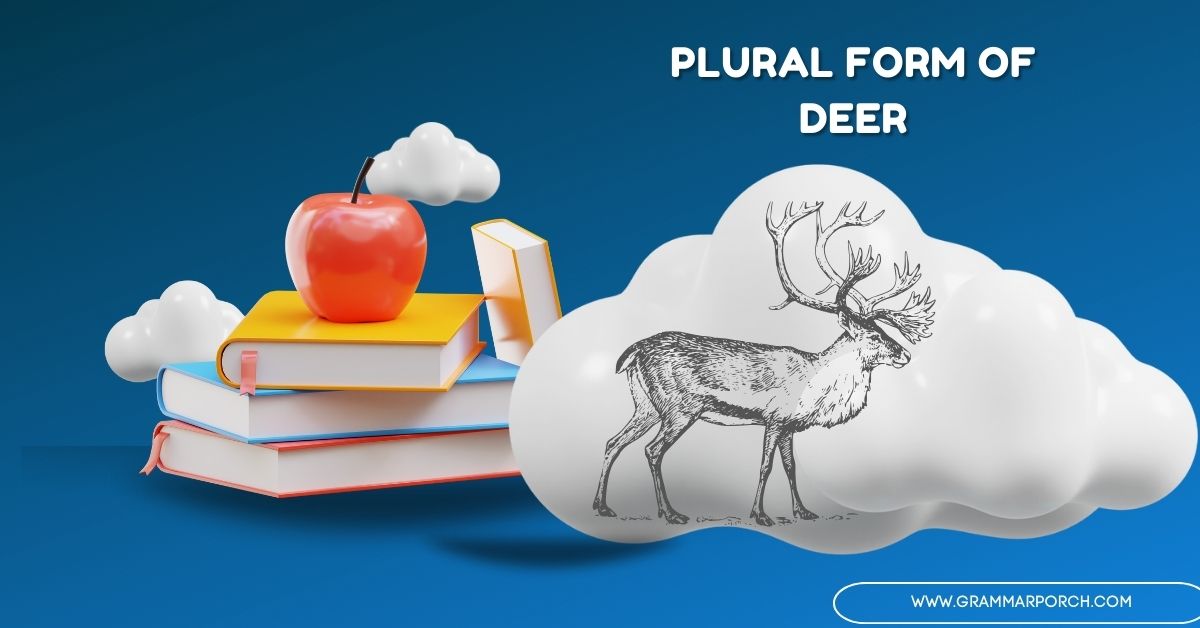Plural Form of Deer !English grammar is full of quirks, and the plural of some words often stumps learners and native speakers alike. One such word is “deer”, which defies typical pluralization rules. Is it “deer” or “deers”? Let’s dive into this comprehensive guide to explore the plural of deer, its origins, grammar rules, and practical examples.
What’s the Plural of Deer?
The plural of “deer” is simply “deer”. Unlike regular nouns in English that add “-s” or “-es” to form their plural, deer belongs to a group of irregular plural forms where the word remains unchanged.
This irregularity often leads to confusion over deer plural, but it’s a fascinating aspect of the English language’s evolution and rules.
Is the Plural Form of Deer “Deer” or “Deers”?
While “deer” is correct for both singular and plural usage, you might occasionally encounter “deers” in certain contexts.
- Standard usage: “Deer” is universally accepted and used.
- Rare exception: “Deers” might appear in specialized contexts like scientific classifications or poetic usage to emphasize different species of deer.
Plural Deer Examples:
- Correct: “Three deer were spotted in the park.”
- Incorrect: “Three deers were grazing in the field.”
Is Deer Singular or Plural?
The beauty of the word “deer” lies in its dual role as both a singular and plural noun.
- Singular: “A deer is standing by the tree.”
- Plural: “A herd of deer was seen in the valley.”
This flexibility contributes to the singular-plural confusion, especially for English learners.
Why Is There Confusion Over the Plural Form of Deer?
The confusion over deer plural arises due to its irregular word patterns. In English, most nouns follow predictable pluralization rules by adding “-s” or “-es.” However, “deer” is part of a group of unique plural forms, like “sheep” and “fish,” that retain the same form in singular and plural.
Is Deer a Countable or Uncountable Noun?
Deer is a countable noun. This means you can count individual deer, even though the word doesn’t change in its plural form.
Deer Countability Examples:
- Singular: “One deer is grazing.”
- Plural: “Ten deer are running in the meadow.”
Plural Form of Deer Example Sentences
Here are some practical examples to demonstrate the usage of “deer”:
- Singular:
- “I saw a deer crossing the road.”
- “The deer looks majestic in the wild.”
- Plural:
- “Deer are often hunted for sport.”
- “A group of deer was resting under the trees.”
Collective Noun for Deer
The most common collective noun for deer is “herd.” Other terms include “mob” or “parcel,” though these are less frequently used.
Deer Herd Meaning:
A herd of deer refers to a group moving or grazing together. It’s often used in ecological and conversational contexts.
Is a Herd of Deer Singular or Plural?
Grammatically, a herd of deer is treated as a singular group noun, but it implies multiple animals.
Sentence Grammar Examples:
- Singular: “The herd is migrating to the forest.”
- Plural: “The deer in the herd are scattered.”
Definition of Deer
Deer are hoofed mammals known for their slender build, antlers, and graceful movements. They are part of the Cervidae family and are commonly found in forests, grasslands, and wetlands.
Deer as a Noun:
The word “deer” describes both individual animals and groups, making it a versatile term in English grammar.
Origin of the Word Deer
The origin of the word deer traces back to Old English “deor,” which initially referred to any wild animal. Over time, its meaning narrowed to describe the animal we know today.
Proto-Germanic Deer Roots:
- Derived from Proto-Germanic “deuzan,” meaning animal.
- The word retained its form due to linguistic evolution and English plural rules.
Plural Nouns in English
English features various patterns for forming plurals, such as:
- Regular nouns: Add “-s” (e.g., cat → cats).
- Irregular plural forms: Words like deer, sheep, and fish don’t change.
- Unique plural forms: Some words have entirely different plurals, like “child → children.”
Irregular Nouns Examples:
| Singular | Plural |
|---|---|
| Deer | Deer |
| Sheep | Sheep |
| Moose | Moose |
Wrapping It Up
Understanding the plural of deer reveals the complexities and beauty of English plural rules. Despite the singular-plural confusion, the word “deer” exemplifies how irregular plural forms enrich our language.
Key Takeaways:
- The plural of deer is “deer.”
- It’s a countable noun used for both singular and plural contexts.
- The herd of deer represents its collective usage.
Next time you spot a group of deer, you’ll know just how to describe it accurately. Keep exploring these grammar rules for deer and other irregular nouns examples to enhance your understanding of linguistic patterns in English.

Larry is an experienced blogger with a passion for simplifying grammar. With years of expertise in writing and language, he shares insightful tips on punctuation, synonyms, and the intricacies of English grammar at **Grammar Porch**. His approachable style helps readers improve their writing skills with ease.

